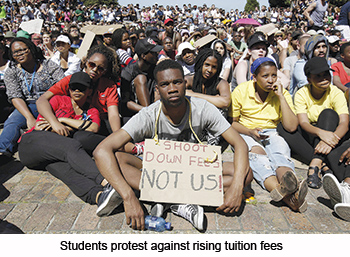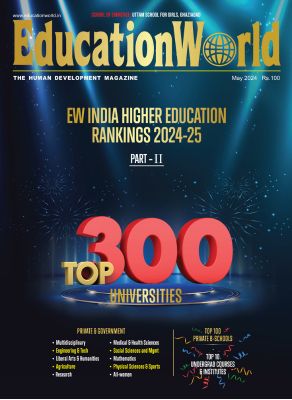 Political deadlock over the future of South Africa’s higher education funding system is pushing the country’s universities to crisis point as institutions are unable to set fees or budgets for the coming year, experts have warned.
Political deadlock over the future of South Africa’s higher education funding system is pushing the country’s universities to crisis point as institutions are unable to set fees or budgets for the coming year, experts have warned.
As South Africa’s academic year draws to a close, universities are facing tough choices over how they will balance their books for the next academic year, which starts in February. While many institutions wish to raise tuition fees to offset deep cuts in state funding, there are widespread fears that this may spark a repeat of the violent unrest seen on campuses in 2015 and 2016. Amid anxiety about an escalation of campus protests, the University of Cape Town has even made its final-year students sit their exams in a large marquee on its rugby fields, using fences, guards in riot gear and dogs to prevent any disruption.
Most universities have yet to announce their tuition fees for 2018, causing havoc for their financial planning, says Martin Hall, emeritus professor in Cape Town’s Graduate School of Business. “This is the equivalent of a UK university in June not knowing what its financial arrangements will be in September,” says Prof. Hall, former vice chancellor of the University of Salford.
“Draconian and unexpected cuts” to research funding, including reductions of up to 90 percent for many individuals funded by the National Research Foundation, had placed “huge pressure” on research-intensive universities, which may be forced to axe staff to balance their books, says Hall. “Cape Town now needs to find money to honour its research commitments at a time when they do not know what their tuition fee income is going to be,” he says.
The financial crisis has been caused by an impasse at the national level over university funding. Many students are campaigning for tuition fees to be scrapped but, last November, the long-awaited recommendations of the country’s higher education funding commission backed a UK-style system of fees repaid via income-contingent loans. Lukewarm reaction to the findings led President Jacob Zuma to float his own plans to make higher education free, despite warnings that the country cannot afford the estimated annual 40 billion rand (Rs.19,161 crore) cost of the policy, which would involve cutting other government expenditure.
The matter, however, has been largely sidelined as attention focuses on December’s African National Congress elections, which will appoint Zuma’s successor. “I don’t think that there will a short-term solution,” says Ahmed Bawa, chief executive of Universities South Africa, who adds that the students “will not give in easily” to the idea of loans. “The big concern is that income-contingent loans will leave students from low-income backgrounds with large amounts of debt, which is why they have rejected this idea.”
Belinda Bozzoli, the former deputy vice chancellor (research) at the University of the Witwatersrand and the opposition Democratic Alliance’s shadow higher education minister, told Times Higher Education that neither the commission’s plans nor scrapping fees was feasible. She has proposed a “middle way” in which the poorest students would receive loans convertible to grants on success, students in middle-level income bands would qualify for a smaller portion of support depending on their family’s income, and richer students would pay fees in full.
“Extreme solutions never work in higher education,” says Prof. Bozzoli, who claims “the government is frightened to acknowledge that it doesn’t have enough money to give fees-free education, so ducked the issue by setting up the commission”.
Universities need to be able to raise tuition fees by 8 percent in 2018 to reflect inflationary cost pressures and reduced subsidy levels, says Bozzoli. Unless this is allowed to happen, “universities will need to start cutting staff because subsidies have gone down in real terms over the past decade, which is why fees are now so important to universities”.
(Excerpted and adapted from The Economist and Times Higher Education)


























